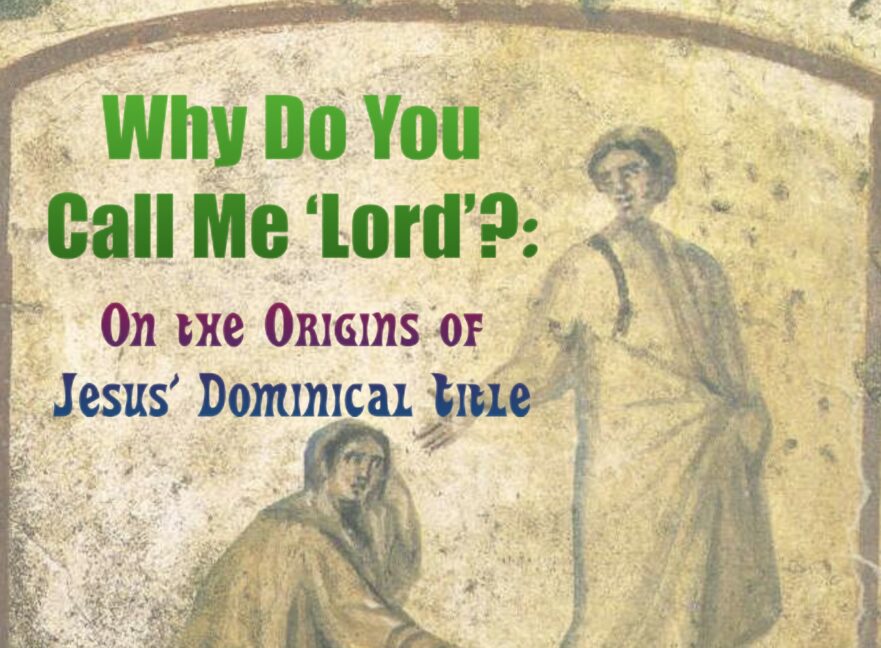How to cite this article: JP Staff Writer, “Why Do You Call Me ‘Lord’?: On the Origins of Jesus’ Dominical Title,” Jerusalem Perspective (2024) [https://www.jerusalemperspective.com/28281/]
| Rather listen instead? |
| JP members can click the link below for an audio version of this essay.[*] Paid Content If you do not have a paid subscription, please consider registering as a Premium Member starting at $10/month (paid monthly) or only $5/month (paid annually): Register One Time Purchase Rather Than Membership  |
According to Peter’s Pentecostal speech in Acts, God made Jesus both Lord and Messiah when he raised Jesus up from the dead (Acts 2:36). But if the Gospels are to be believed,[1] people were addressing Jesus as “Lord!” long before that. To be sure, some scholars have maintained that the Gospel accounts in which people address Jesus as “Lord” are anachronistic, projecting a post-Easter perspective back into earlier stages of Jesus’ career. Such scholars typically regard “Lord” either as a messianic title or as a confession of Jesus’ divinity, neither of which would be appropriate for the Galilean miracle-worker. But although Peter’s speech links the titles “Lord” and “Messiah,” the title “Lord” is not inherently messianic nor intrinsically a claim of divinity. To demonstrate that this is so, we must examine the terminology that lies behind the title “Lord” in the Synoptic Gospels.
The Terminology
When discussing Jesus’ dominical title, “Lord,” in the Synoptic Gospels we are primarily concerned with the Greek noun κύριος (kūrios, “lord”) and especially its vocative form κύριε (kūrie, “Lord!”), the form used for direct address. In Luke’s Gospel there also appears the noun ἐπιστάτης (epistatēs, “commander,” “master”), a synonym for κύριος, which always occurs in the vocative form ἐπιστάτα (epistata, “Commander!” “Master!”).
Paid Content
Premium Members and Friends of JP must be logged in to access this content: Login
If you do not have a paid subscription, please consider registering as a Premium Member starting at $10/month (paid monthly) or only $5/month (paid annually): Register
One Time Purchase Rather Than Membership
Rather than purchasing a membership subscription, you may purchase access to this single page for $1.99 USD. To purchase access we strongly encourage users to first register for a free account with JP (Register), which will make the process of accessing your purchase much simpler. Once you have registered you may login and purchase access to this page at this link:
Conclusion
Addressing Jesus as “Lord!” likely had humble beginnings, originating among those who came to Jesus seeking his aid as a healer. Greek and Hebrew sources reveal that it was customary to address healers as κύριε (kūrie, “Lord!”) / אֲדוֹנִי (’adōni, “My lord!”). But what began as a polite form of address took on greater meaning as the significance of Jesus to his followers increased. As they came to regard Jesus not merely as a healer but as “both Lord and Messiah” (Acts 2:36), addressing Jesus as “Lord!” became a declaration of faith and commitment. Eventually the confession “Jesus is Lord” was perceived as a direct challenge to the supremacy of Caesar, as Jesus’ followers swore their ultimate allegiance not to the State but to the Kingdom of Heaven. It may seem paradoxical in view of its mundane origins that addressing Jesus as “Lord!” could take on such cosmic proportions, but it is hardly ironic in view of Jesus’ own teachings. Greatness in God’s Kingdom requires becoming the servant of all.
Paid Content
Premium Members and Friends of JP must be logged in to access this content: Login
If you do not have a paid subscription, please consider registering as a Premium Member starting at $10/month (paid monthly) or only $5/month (paid annually): Register
One Time Purchase Rather Than Membership
Rather than purchasing a membership subscription, you may purchase access to this single page for $1.99 USD. To purchase access we strongly encourage users to first register for a free account with JP (Register), which will make the process of accessing your purchase much simpler. Once you have registered you may login and purchase access to this page at this link:
- [1] For doubts regarding the testimony of the Gospels in this regard, see Werner Foerster, “κύριος,” Theological Dictionary of the New Testament (ed. Gerhard Kittel and Gerhard Friedrich; trans. Geoffrey W. Bromiley; 10 vols.; Grand Rapids: Eerdmans, 1964-1976), 3:1039-1095, esp. 1094. ↩
































































































Comments 2
It seems like “rav” is likely the Hebrew behind epistatēs – much more likely than ba’al, which you discuss. Could you address how “rav” would be used along with the other titles?
Author
Thanks, Lois, for your question. This a good example where synoptic interrelationships need to be taken into consideration before jumping straight into Hebrew reconstruction. In the Synoptic Gospels the Greek term epistatēs (“leader,” “commander”) occurs only in Luke’s Gospel, and it sometimes does so in parallel with didaskalos in Matthew, so it seems more likely that epistatēs is a Lukan substitute for didaskalos than that epistatēs goes back to a different Hebrew term. As we noted above, there is strong evidence that didaskalos is the Greek equivalent of rav.
Hope that helps, but if not, try asking another way and we’ll try to clarify further.